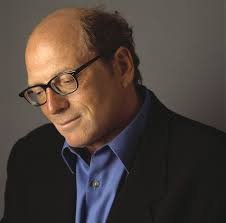A Quote by George Saunders
When I think about what fiction does morally, I'm happier thinking of a person full of multiplicities - sort of fragmented.
Related Quotes
Biggest lesson? Discovering that the less I think about myself and the more I think about what I can do for others, the more I get out of life. Ultimately, it makes me a happier person. You have to give it away if you want to get it back. After all, humility isn't thinking less of yourself, it's thinking of yourself less.
Everyone does what they can to avoid thinking. Laziness is the most basic human trait. People don't want to think -- they can't make the connection between entertainment and thought, they want immediate kicks. People will not be human until they get pleasure from thought. Only a thinking person can be a full person.
Some people spend their entire lives thinking about one particular famous person. They pick one person who's famous, and they dwell on him or her. They devote almost their entire consciousness to thinking about this person they've never even met, or maybe met once. If you ask any famous person about the kind of mail they get, you'll find that almost every one of them has at least one person who's obsessed with them and writes constantly. It feels so strange to think that someone is spending their whole time thinking about you.
Even when you think you can detach yourself from the characters, you don't. Because you're spending so much time trying to realize this person and make them real that they do infect you, in a way. And you do take them home and live with them, even if you think you're turning the character off. But in order to pull off a role convincingly, you wind up thinking about that person all the time, and it does sort of creep into you. And then there are things that you'll respond to, or react to in a very different way than you would normally.
Society today is being fragmented by a way of thinking that is inherently short-sighted because it disregards the full horizon of truth - the truth about God and about us. By its nature, relativism fails to see the whole picture. It ignores the very principles that enable us to live and flourish in unity, order and harmony.
When we are not engaged in thinking about some definite problem, we usually spend about 95 percent of our time thinking about ourselves. Now, if we stop thinking about ourselves for a while and begin to think of the other person's good points, we won't have to resort to flattery so cheap and false that it can be spotted almost before it is out of the mouth.
Science fiction isn't just thinking about the world out there. It's also thinking about how that world might be - a particularly important exercise for those who are oppressed, because if they're going to change the world we live in, they - and all of us - have to be able to think about a world that works differently.
Science fiction isn’t just thinking about the world out there. It’s also thinking about how that world might be—a particularly important exercise for those who are oppressed, because if they’re going to change the world we live in, they—and all of us—have to be able to think about a world that works differently.





































